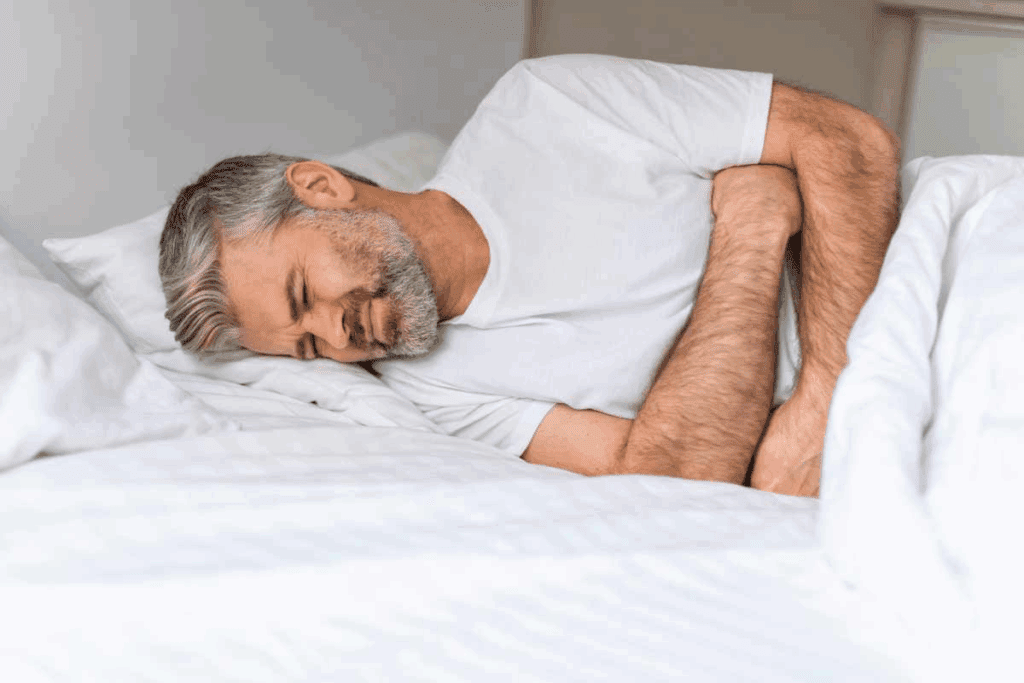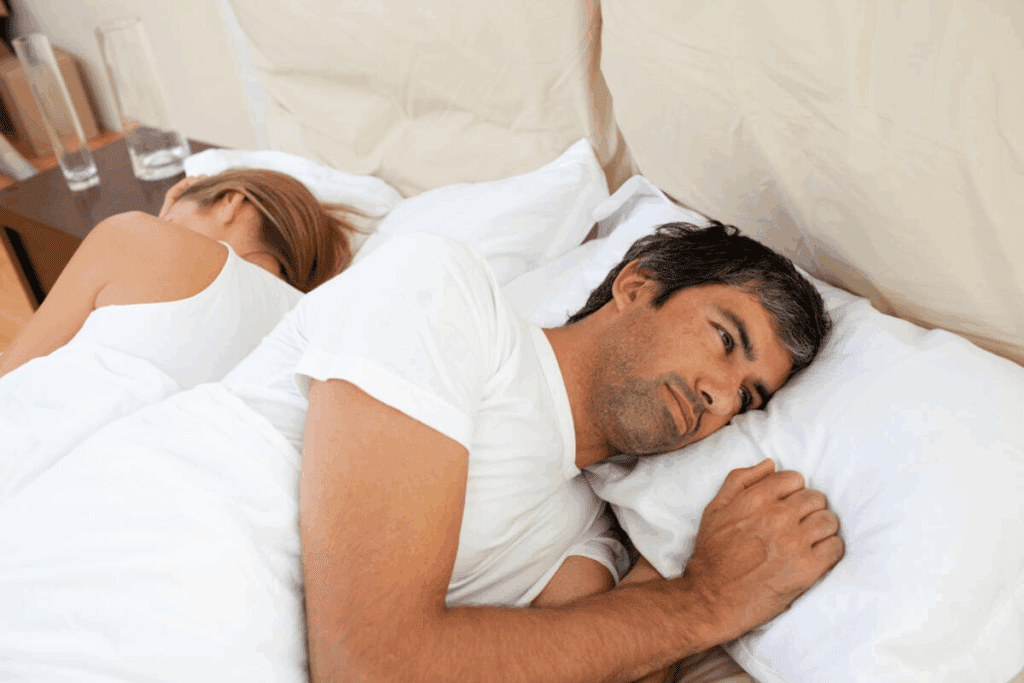Last Updated on October 31, 2025 by Bilal Hasdemir

Erectile dysfunction (ED) is a common issue affecting millions of men globally. While low testosterone is often seen as a cause, the connection is more complex than many think.Testosterone impotence: Learn about the link between low testosterone (low T) and erectile dysfunction (ED) and how it’s treated.
At Liv Hospital, we know that finding the right treatment starts with a clear diagnosis. Studies show that about one in three men with ED also have testosterone deficiency. Yet, fixing this deficiency doesn’t always solve the ED problem.
We aim to fully understand how testosterone levels and ED are connected. Our method involves looking at all factors that lead to their occurrence. This way, we ensure our patients get the best care possible.

Testosterone is key for male sexual health. It affects libido and erectile function. Knowing its role is important for healthy sexual performance.
Testosterone is made mainly in the testes. It’s vital for male reproductive tissues and secondary sexual traits. It also regulates libido, bone density, and muscle mass.
Testosterone directly impacts libido, or sex drive. Higher levels mean more libido, while low levels mean less. It also affects arousal by influencing the brain’s sexual response.
Studies show testosterone therapy can boost libido in men with low levels. But, the link between testosterone and libido is complex. It depends on health, mental state, and relationships.
“Testosterone is the key driver of male libido, and its deficiency can lead to significant sexual dysfunction.”
A study found men with more testosterone had better erectile function and libido. Here’s a summary:
Testosterone Level | Libido Score | Erectile Function Score |
Low (<300 ng/dL) | 2.5 ± 0.5 | 3.2 ± 0.8 |
Normal (300-1000 ng/dL) | 4.8 ± 0.7 | 4.5 ± 0.9 |
High (>1000 ng/dL) | 5.0 ± 0.6 | 4.8 ± 0.7 |
Men with normal to high testosterone levels had better libido and erectile function. This is compared to those with low testosterone.
In conclusion, testosterone is vital for male sexual health. It impacts libido and erectile function. Understanding this can help address health issues related to sexual function.

Erectile dysfunction (ED) is a common issue affecting millions of men globally. It has many causes, making it important to understand them for better treatment.
ED often results from poor blood flow to the penis. This can be due to high blood pressure and high cholesterol. These issues can harm blood vessels, making it hard to get or keep an erection.
Other common reasons for ED include:
Also, psychological factors like stress, anxiety, and depression can lead to ED. Often, ED is caused by a mix of factors, needing a detailed treatment plan.
ED becomes more common with age. Research shows it affects a lot of men, mainly those over 40.
Studies show the prevalence of ED by age group as follows:
Age Group | Prevalence of ED |
40-49 years | Approximately 20% |
50-59 years | Around 30% |
60-69 years | Nearly 40% |
Knowing how ED affects different age groups helps doctors create better treatment plans for their patients.
Erectile dysfunction and low testosterone are two conditions that can affect men’s sexual health. They are not the same, but they can happen together. It’s important to understand how they relate based on scientific evidence and data.
Many studies have looked into how testosterone affects erectile function. Testosterone is key for male sexual health, impacting libido and ability to get an erection. It works with the nitric oxide pathway, which is vital for erections.
But, the connection between low testosterone and erectile dysfunction is not simple. Low testosterone is not the main reason for erectile dysfunction in most men.
Key studies have found that testosterone therapy can help some men with low testosterone. But, it’s not a cure-all for erectile dysfunction. Other factors like blood flow, brain health, and lifestyle also matter a lot.
Research shows that many men with erectile dysfunction also have low testosterone. About 18.7% of men with erectile dysfunction have low testosterone below 280 ng/dL. But, only about 5% of all erectile dysfunction cases are due to hypogonadism.
This means low testosterone is not the main cause of erectile dysfunction for most men. The link between low testosterone and erectile dysfunction changes with age and different groups of people. Knowing this helps doctors find the right treatment for each man.
Testosterone is key for male sexual health, focusing on penile tissue and function. Knowing how testosterone impacts penile health helps tackle erectile dysfunction.
The corpora cavernosa are two cylindrical bodies in the penis. Testosterone greatly affects their structure and function. Research shows testosterone helps grow and keep erectile tissue healthy, allowing for erections.
Low testosterone can harm the corpora cavernosa. It can reduce smooth muscle and increase fibrosis. These changes can make it hard to get an erection, leading to erectile dysfunction.
Vascular health is vital for erections, as blood flow to the penis is needed. Testosterone improves vascular health, boosting endothelial function and blood flow.
Testosterone deficiency can cause vascular problems. This includes less nitric oxide and poor vasodilation. These issues can reduce erectile function and lead to erectile dysfunction.
In summary, testosterone affects penile tissue and function in many ways. It impacts both the corpora cavernosa and vascular health. Understanding these effects is key to treating erectile dysfunction.
The Sequence of Symptoms: Libido First, Erections Later
Men with low testosterone often see a drop in libido before erectile issues. This order of symptoms shows the body’s changes due to low testosterone.
Low testosterone, or hypogonadism, shows up in different ways. A common pattern is a drop in sexual desire before erectile problems. This is because testosterone helps control libido and the complex steps to get and keep an erection.
At first, men might feel less sexual desire or interest. This change can be small and not linked to erectile issues right away. But as testosterone drops more, erectile problems may show up.
It’s key to tell apart low libido and erectile dysfunction. Libido is about sexual desire, while erectile dysfunction is about getting or keeping an erection.
Libido is directly tied to testosterone levels. But erectile dysfunction can come from many things, like blood flow, nerves, and hormones.
To show how testosterone, libido, and erectile function are linked, look at this table:
Testosterone Level | Libido | Erectile Function |
Normal | Normal | Normal |
Low | Decreased | Normal or slightly impaired |
Very Low | Significantly decreased | Impaired |
Knowing this sequence helps in diagnosing and treating low testosterone. Testosterone replacement therapy (TRT) might boost libido and help with erectile function too.
Diagnosing low testosterone in men with erectile dysfunction needs a detailed medical check-up. We’ll show you how to find out if low testosterone is causing your erectile issues. This includes blood tests and clinical checks.
Blood tests are key for checking testosterone levels. Testosterone levels can change during the day. So, blood tests are usually done in the morning when levels are at their peak.
A hormone panel might also be done. It checks for other hormonal imbalances that could be causing symptoms.
Test Type | Purpose | Timing |
Total Testosterone | Measures the total amount of testosterone in the blood | Morning |
Free Testosterone | Measures the amount of testosterone that is not bound to proteins | Morning |
Hormone Panel | Assesses other hormone levels that may be related to symptoms | As needed |
If you think you might have low testosterone and erectile dysfunction, see a doctor. A healthcare provider can find out why you’re experiencing symptoms. They’ll then suggest the best treatment.
Look for medical help if you notice:
Men with erectile dysfunction and low testosterone might find relief in testosterone replacement therapy (TRT). TRT aims to bring testosterone levels back to normal in men with hypogonadism.
There are many ways to get testosterone replacement therapy. Each method is different:
About 30-35% of men with ED and low testosterone see big improvements with TRT. But, success can depend on many things like the cause of ED, the TRT type, and the patient.
Treatment Type | Success Rate | Administration Frequency |
Injections | 30-40% | Every 1-4 weeks |
Gels/Creams | 25-35% | Daily |
Patches | 20-30% | Daily |
Pellets | 35-45% | Every 3-6 months |
TRT can also boost libido in men with low testosterone. It helps by bringing testosterone levels back to normal. But, results can differ from person to person.
Men thinking about TRT should talk to their doctor. They need to know what to expect and the possible risks. It’s also important to watch for changes in sex drive and function during treatment.
Testosterone replacement therapy (TRT) is a common treatment for low testosterone in men. But, it’s important to know its possible side effects. While it helps men with hypogonadism, it also comes with risks.
Men on TRT might face several common side effects. These include:
It’s key for men thinking about TRT to talk to their healthcare provider about these side effects.
The long-term safety and success of TRT are not well studied. This raises concerns about long-term health risks. Some of these risks are:
Potential Risk | Description |
Cardiovascular Issues | Some studies link TRT to higher cardiovascular risk. |
Prostate Health | There’s debate about TRT’s impact on prostate health. |
Blood Cell Count | TRT can change blood cell count, possibly increasing red blood cells. |
Men thinking about TRT should know these long-term health risks. They should talk to their healthcare provider about them.
Understanding TRT’s common side effects and long-term health risks helps men make better choices. They can decide if TRT is right for them.
Testosterone affects erectile function in complex ways. Both too little and too much can cause problems. It’s important for male sexual health, but its effects are not straightforward.
High testosterone levels can sometimes cause erectile dysfunction. This might seem odd at first. Hormonal balance is key for sexual health. Too little or too much testosterone can mess with normal erectile function.
A study found that testosterone and erectile function aren’t directly related. There’s an ideal range, and going outside it can cause problems. This shows we need to understand testosterone’s role in erectile health.
Keeping hormones in balance is vital for sex health. Testosterone is important for libido and erections, but it’s not the only hormone. Testosterone and other hormones, like estrogen, need to be in balance for good sex.
“Testosterone replacement therapy, while beneficial for men with low testosterone, must be carefully managed to avoid supraphysiological levels that could potentially lead to adverse effects, including erectile dysfunction.”
This quote highlights the need for careful testosterone management.
In summary, testosterone is vital for male sex health, but too little or too much can cause erectile dysfunction. Finding the right balance is essential. By grasping the complex link between testosterone and erectile function, we can improve diagnosis and treatment of erectile dysfunction.
Lifestyle choices greatly impact testosterone levels and erectile health. Daily habits like diet, exercise, sleep, and stress levels affect these areas.
Eating well is key for testosterone. Foods rich in protein, healthy fats, and carbs help keep testosterone levels up. Exercise, like weight training and HIIT, also boosts testosterone.
A study in the Journal of Clinical Endocrinology and Metabolism found that weight training increases testosterone in men. Exercise improves physical health and sexual function by boosting blood flow and reducing inflammation.
Nutrient | Food Sources | Impact on Testosterone |
Protein | Lean meats, fish, eggs, dairy | Supports muscle mass and testosterone production |
Healthy Fats | Nuts, seeds, avocados, olive oil | Essential for hormone production |
Complex Carbohydrates | Whole grains, fruits, vegetables | Provides energy for workouts and overall health |
Good sleep is vital for testosterone. Lack of sleep lowers testosterone. Chronic stress also harms testosterone by raising cortisol levels.
“Sleep is essential for hormonal balance, and testosterone is no exception. Ensuring adequate rest is vital for maintaining healthy testosterone levels.”
Managing stress with meditation, yoga, or deep breathing helps testosterone. Good sleep and stress management are key for testosterone and erectile function.
In conclusion, lifestyle choices like diet, exercise, sleep, and stress management are critical for testosterone and erectile health. Making smart choices supports sexual health and well-being.
Knowing when to see a doctor for erectile dysfunction and low testosterone is key. Men with ongoing or severe symptoms should get checked out.
Some symptoms mean you need to see a doctor right away. These include:
Spotting these signs early can help get the right treatment sooner.
Having a strong desire for sex but trouble getting an erection is confusing. It might point to problems like blood flow issues or mental health concerns.
“Erectile dysfunction can be a complex condition, and its causes can be multifaceted. High libido with ED might suggest that the issue lies not with desire but with the physiological or psychological aspects of achieving an erection.”
Before your doctor visit, get ready by:
Being ready can make your visit more effective and ensure you get the care you need.
Understanding when to get medical help and how to prepare can help you tackle erectile dysfunction and low testosterone.
Understanding how low testosterone and erectile dysfunction are connected is key. We’ve looked at how testosterone affects sexual health and the ups and downs of testosterone therapy.
The link between low testosterone and erectile issues is complex. It involves many factors, including hormones and body functions. Men can find the right medical help by knowing the signs of low testosterone.
Testosterone is vital for men’s health, affecting sex drive and ability to get an erection. Therapy can help, but it’s important to consider the good and bad sides.
To tackle low testosterone and erectile problems, we need a detailed plan. Working with doctors, men can find treatments that boost their sexual health. This way, they can overcome the hurdles of low testosterone and erectile dysfunction.
Low testosterone can contribute to erectile dysfunction. But it’s not the main cause for most men. Testosterone is key for male sexual health, affecting both desire and ability to get an erection.
Testosterone greatly affects libido and arousal. Low levels can lead to less desire for sex, which can then cause erectile dysfunction.
Erectile dysfunction has many causes. These include vascular disease, diabetes, neurological disorders, and hormonal imbalances like low testosterone.
Yes, TRT can boost libido in men with low testosterone. It helps restore normal testosterone levels, improving sexual desire and function.
Yes, too much testosterone can cause erectile dysfunction. Hormonal balance is key for good sexual health. Both low and high testosterone levels can lead to sexual problems.
Lifestyle factors like diet, exercise, sleep, and stress management are important. They help keep testosterone levels and erectile function healthy. A healthy lifestyle supports male sexual health.
Warning signs include persistent erectile dysfunction and decreased libido. Other symptoms of low testosterone also need medical attention. Men with these symptoms should see a doctor.
Having a high libido but erectile dysfunction might mean the issue is not testosterone. It could be due to vascular health or psychological factors.
To prepare, gather info on your symptoms, medical history, and lifestyle. Discuss your sexual health and consider a blood test for testosterone levels.
Nugenix, like any supplement, can cause side effects. Always talk to a healthcare professional before starting any new supplement, including Nugenix, to discuss risks and benefits.
There’s no strong evidence that sex significantly lowers testosterone levels. Testosterone levels can change for many reasons, but sex is not a main cause of long-term changes.
Subscribe to our e-newsletter to stay informed about the latest innovations in the world of health and exclusive offers!
WhatsApp us